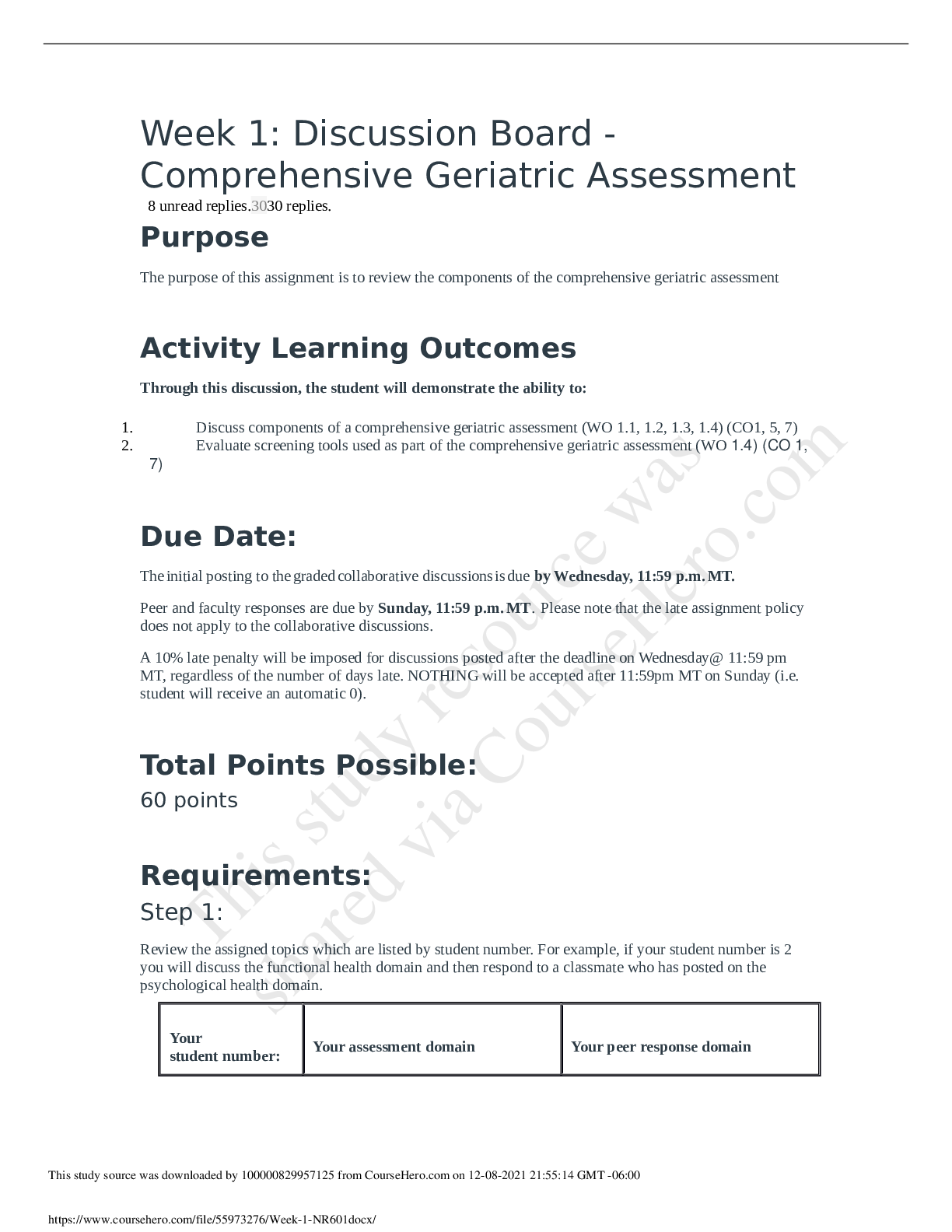Pharmacology > DISCUSSION POST > Chamberlain College of Nursing - NR 508/NR508 Advanced Pathophysiology_Week_3_Discussion. (All)
Chamberlain College of Nursing - NR 508/NR508 Advanced Pathophysiology_Week_3_Discussion.
Document Content and Description Below
Week 3: Discussion 30 30 unread replies. 32 32 replies. Mr. Russell is a 73-year-old male who presents to your clinic with complaints heart palpitations and light headedness on and off for the past... 3 months. He has a history of hypertension and is currently prescribed HCTZ. He also is complaining of heartburn and belching after a large meal. Vital Signs: B/P 159/95, Irregular HR 88, Resp. 22, Weight 99 kilograms Lower extremities with moderate 3+edema noted in left leg, 2 + edema in right leg, ABD + BS, Neuro AOX3, Labs: NA 143mEq/L, CL 99 mmol/L BUN 18mg/dL, Hbg 15, TC 234 mg/dL, LDL 137 mg/dL, HDL 35 mg/dL, triglycerides 241mg/dL, What are your treatment goals for Mr. Russell today? What is your pharmacologic plan; please state your rationale for your plan? What are five key patient education points based on your plan? How would your plan change if your patient is African American? Search entries or author Search entries or author Filter replies by unread Reply Reply to Week 3: Discussion Collapse SubdiscussionPatrick Ryan Patrick Ryan Jan 17, 2019 Jan 17 at 8:05am Class, This week we will focus on Mr. Russell, a 69-year-old man who presents with intermittent palpitations and lightheadedness. The details of his case are outlined above. Remember to use evidence-based resources in your responses! Dr Ryan Reply Reply to Comment Collapse SubdiscussionNaira Yon Naira Yon Monday Jan 21 at 3:13pm Professor and classmates, My treatment goals for Mr. Russell today are to assess his current medications and lifestyle so that I can make modifications to improve his blood pressure, palpitations, dizziness, heartburn and belching, high lipid levels and this edema to bilateral lower extremities. After reviewing Mr. Russell’s history, signs and symptoms, lifestyle and current medications I believe that his hypertension has progressed to congestive heart failure (CHF). I suspect CHF because of his presenting symptoms of dizziness, bloating, water retention, rapid heartbeat, and heartburn; these are all signs and symptoms of congestive heart failure (Woo & Robinson, 2016). To begin I would like to order some additional tests to help confirm my diagnosis of CHF in Mr. Russell. I would order a baseline proBNP as this is a fine indicator of CHF disease and its progression as the disease progresses (Woo & Robinson, 2016). I would also like to check electrolyte levels such as potassium and magnesium as diuretics such as HCTZ can affect these values and irregular heartbeat can also be affected by electrolyte imbalances (Woo & Robinson, 2016). Additionally, an EKG should also be done to confirm if the irregular heartrate is atrial fibrillation and an ECHO to determine cardiac function and a chest x-ray to determine if there is pulmonary congestion that can be casing shortness of breath and an increased respiratory rate of 22 breaths per minute (Woo & Robinson, 2016). While I wait for the results, I would like to make modifications to Mr. Russell’s medications. I would discontinue his hydrochlorothiazide and add a beta blocker, a loop diuretic, and a lipid-lowering agent. I would start Mr. Russell on metoprolol succinate extended release (Lopressor) 25 mg once daily (Ong & Kow, 2011). Metoprolol is a B1-adrenergic blocking agent that competes with adrenergic neurotransmitters at the receptor; the blocking if the beta 1-receptor results I a decrease in heart rate, cardiac output, and blood pressure (Ong & Kow, 2011). I would also start Mr. Russell on furosemide (Lasix) 20 mg daily in the morning (Ong & Kow, 2011). Loop diuretics commonly known as water pills help to eliminate extra water that has accumulated in the lower extremities by inhibiting water reabsorption in the nephron by blocking the sodium-potassium-chloride cotransporter in the ascending limb of the Hoop of Henle (Ong & Kow, 2011). The lipid-lowering agent that I would prescribe for Mr. Russell would be atorvastatin (Lipitor) 20 mg daily at night time (Ong & Kow, 2011). Atorvastatin lowers the cholesterol in the body by blocking the excess cholesterol-producing enzyme in the liver by inhibiting HMG-coenzyme A and decreases the production of LDL cholesterol (Woo & Robinson, 2016). As far as education for the patient: With a diagnosis of CHF, it is important to monitor one’s weight daily and call or go see your PCP if your gain two pounds or more in one day or more than five pounds in a week (Woo & Robinson, 2016). Limit your salt intake by avoiding processed foods, canned foods, fast food, avoid adding salt to cooked food, and use herbs and spices to season food instead of salt (Woo & Robinson, 2016). Take medications as prescribed and do not make changes or stop taking your medications without consulting your health care provider and monitor you heart rate and blood pressure before taking your medication. Keeping active is very important, you should try to do activities that you can tolerate at least 3 times per week. If any of your symptoms (edema, shortness of breath, light headedness, unexplained weight gain, fatigue, or your heart rate or blood pressure are too high or too low (Woo & Robinson, 2016). If Mr. Russell was African American, I would consult with a cardiologist as African Americans have a genetic predisposition to hypertensions, diabetes, high cholesterol, and kidney disease (Woo & Robinson, 2016). Ong, H. T., & Kow, F. P. (2011). Beta-blockers for heart failure: Why you should use them more. Journal of Family Practice, 60(8): 472-477. Woo, T. M., & Robinson, M. V. (2016). Pharmacotherapeutics for Advance Practice Nurse prescribers (4th ed.). Philadelphia, PA: F. A. Davis Company. Naira Reply Reply to Comment Collapse SubdiscussionPatrick Ryan Patrick Ryan Yesterday Jan 24 at 11:06pm Hi Naira, Thanks for your post! You mention adding a statin for this patient, which is a wonderful idea based off of the patients ASCVD. With certain statins it is recommended to take them at night, why is this and which statins carry this recommendation? Dr Ryan Reply Reply to Comment Collapse SubdiscussionSusan Siut Susan Siut Tuesday Jan 22 at 8:13am Dr. Ryan and Class, What are your treatment goals for Mr. Russell today? Irregular heart rate: Mr. Russell’s immediate matter at this time is his irregular heart rate condition with palpitations and lightheadedness over the past three months. This could be signs and symptoms of atrial fibrillation which calls for an electrocardiogram (EKG) to be completed to corroborate the suspicions (The American Heart Association, The American College of Cardiology Foundation and The Heart Rhythm Society [AHA/ACC/HRS], 2014). The best practice is to compare previous EKGs that have been done throughout his past medical history. Also, Mr. Russell might be exhibiting symptoms of heart failure which may have an association with new-onset atrial fibrillation AHA/ACC/HRS, 2014) he will need a chest x-ray to evaluate pulmonary congestion (AHA/ACC/HRS, 2014). It is most definitely in Mr. Russell’s best interest to be referred to a cardiologist for complete workup which can include a transesophageal echocardiography to assess the presence of left atrial thrombi which places him in high risk category for stroke, pulmonary embolism and assistance in planning of possible cardioversion (AHA/ACC/HRS, 2014). His risks of thromboembolism need to be addressed with Mr. Russell with individualized treatment tailored to share decision making (AHA/ACC/HRS, 2014). The CHA2DS2-VASC scoring tool helps to establish a risk of stroke related to atrial fibrillation and can be a beneficial tool in assisting Mr. Russell understanding the risk vs. benefits of whether or not antithrombotic therapy is beneficial for him at this point. Mr. Russell’s CHA2DS2-VASC score of 2 places him at a 2.2% risk of stroke within a year. (AHA/ACC/HRS, 2014). The type of antithrombotic therapy initiated is based on whether his atrial fibrillation is valvular in its pathology or if further workup is necessary perhaps with the TEE, and a different type of medication should be prescribed as atrial fibrillation associated with mitral stenosis increases the risk of stroke 20 times over those with non-valvular atrial fibrillation (AHA/ACC/HRS, 2014). Hypertension and Lower Extremity Edema: The edema in Mr. Russell’s lower extremities could indicate heart failure. His renal function is good, so it isn’t leading to a real issue at this time. I will need a couple more tests such as a brain natriuretic peptide (BNP), Chest x-ray, echocardiogram, and TEE. The echo will help diagnose heart failure if the ejection fraction is <40% (American College of Cardiology Foundation/American Heart Association Task Force on Practice Guidelines [ACCF/AHA], 2013). We have also read about the stages of heart failure A through D (Woo & Robinson, 2016). The New York Heart Association Functional Classification (NYHA) which ranges from I-IV and is based on the patient’s symptoms on exertion and at rest (ACCF/AHA, 2013). Our patient’s hypertension could also be associated with possible heart failure. Another consideration besides HCTZ may need consideration such as Potassium levels; these labs would also be added to see if he is hypokalemic which could be an underlying cause of his atrial fibrillation (American College of Cardiology [ACC], 2017). Cholesterol levels Using the atherosclerotic cardiovascular disease (ASCVD) risk calculator Mr. Russell is a 41.1% 10-year risk of ASCVD and should begin high-intensity statin therapy with the goal to reduce his LDL by 50% (American College of Cardiology [ACC], 2018). What is your pharmacologic plan; please state your rationale for your plan? Atrial Fibrillation therapy Currently, Mr. Russell’s heart rate is irregular at 88bpm. His CHA2DS2-VASC places him with a score of 2 a lower risk for stroke. The American Academy of Family Physicians clinical guidelines recommends anticoagulation therapy for scores <2. My choice of anticoagulant would be Rivaroxaban (Xarelto) 20mg PO daily with evening meals. I chose Xarelto over warfarin because they are both effective in preventing stroke in patients with atrial fibrillation and nonvalvular etiology and similar adverse reactions. Xarelto is managed easily without weekly or bi-weekly blood work for PT/INR as is with warfarin. Also, our patient will not have to worry about a diet with foods rich in Vitamin K or modifying a diet with Xarelto as he would with warfarin. Hypertension associated with probable heart failure Mr. Russell’s blood pressure is 159/95, with lower extremity edema still while taking HCTZ. I would start our patient on an ACE inhibitor such as Lisinopril 10 mg PO daily and increase his dose of HCTZ to twice a day to help him lower his blood pressure and eliminate some of the fluids in his lower extremities. We still have labs that are pending such as Potassium level and renal function, this course of action is the best one until his follow up appointment next visit, goals for blood pressure according to the American College of Cardiology [ACC], is <130 SBP. Cholesterol Management I will start Mr. Russell on Atorvastatin 80 mg PO daily because the ACC recommends high-intensity statin to lower LDL by >50% for patients who are high risk for ASCVD. Our patient’s ASCVD risk is 41.1%. GI upset with possible GERD Working out the suspicions of a cardiovascular cause of his mentioned GERD symptoms, I would prescribe Mr. Russell a proton pump inhibitor under the guidelines (American College of Gastroenterology [ACG], 2013. Omeprazole (Prilosec) can be obtained over the counter, but I can prescribe the prescription so that it is covered by his insurance. What are five key patient education points based on your plan? Teaching lifestyle modifications with specific guidelines remain the cornerstone of cardiovascular disease (CVD). Lifestyle changes and management of diet warrants primary as well as secondary prevention situations. According to the American Heart Association, it is recommended to limit dietary intake of cholesterol to <300 mg/day. This amount is intended for patients who are at high risk of heart disease. An example is limiting food in our diet such as egg consumption to 3 per week. This recommendation is based on scientific evidence. A diet high in cholesterol increases serum cholesterol concentrations. A diet which replaces saturated fats with low carbohydrate intake resulted in a reduction in LDL across the sexes and ethnicity. Among those who demonstrated a low-carbohydrate diet, there were significant decreases in triglycerides and an increase in HDL, without influences LDL (Enkhmaa, 2018). Most common adverse reactions for ACEIs such as Lisinopril is a dry hacking cough or allergic, flu-like symptoms, sinusitis and upper respiratory infections. This is due to the mechanisms of proinflammatory cytokine accumulation. These are consequences that need to be reported to your provider immediately (Pinargote, Guillen & Guarderas, 2014). Stroke Symptoms using F.A.S.T. Facial drooping, arm weakness, speech difficulty, time to call 9-1-1. Heart attack symptoms are chest discomfort, discomfort in other areas of the upper body, shortness of breath, cold sweat, nausea or lightheadedness. Making sure the patient understands the signs and symptoms to identify when they might be experiencing a heart attack or stroke (American Heart Association, 2019). First of all, it is imperative that patients understand the importance of adherence. 9% of all cardiovascular events in Europe were contributed to non-adherence. The importance of compliance due to the half-life of new oral anticoagulants (NOACs) needs to be emphasized. The missed dose can be taken within 12 hours. Any longer than this time should be omitted till their next dose is scheduled. The drug is not affected by food intake of vitamin K. The main adverse effect of this class is bleeding. It should be made perfectly clear that these medications come with a risk of hemorrhage and may cause excessive bruising, epistaxis, hematuria, hemoptysis, hematemesis, melaena, abnormal genitourinary bleeding. If patients start experiencing these symptoms, they should call their provider immediately (Bhandal, Pattinson, 2013). Short term therapy with proton pump inhibitors (PPI) is used extensively in the treatment of gastric acidrelated diseases such as peptic ulcer disease, erosive esophagitis, and gastroesophageal reflux disease to name a few. However, long term use of PPIs may lead to osteoporotic fracture, renal damage, various infections, rhabdomyolysis, nutritional deficiencies such as vitamin B12, magnesium, and iron, anemia, and thrombocytopenia. Because of these adverse effects, we will use this drug short term (Yu, Sun, Zhang, et al., 2017). How would your plan change if your patient is African American? Studies have found that African-American patients with heart failure/reduced ejection fraction have found that hydralazine-isosorbide dinitrate has found to improve quality of life and mortality rates in studies. This study suggests that adding nitrates and hydralazine to therapy can ultimately reduce heart failure admissions as well as mortality rates. Researchers attribute genetic characteristics to this combination. Evidenced-based practice reports that his regimen along with the CHF standard treatment is beneficial (Ziaeian, Fonarow, Heidenreich, 2017). [Show More]
Last updated: 1 year ago
Preview 1 out of 81 pages
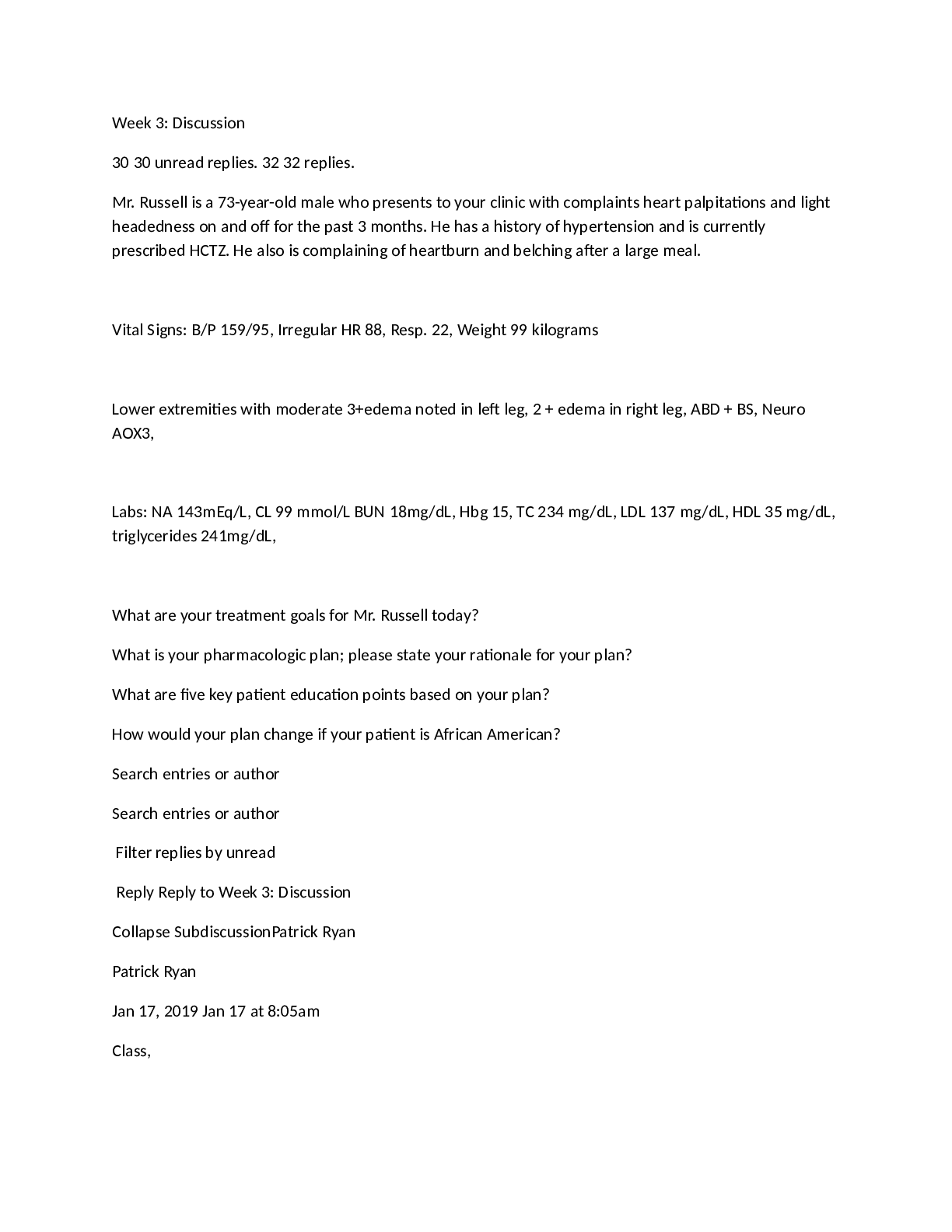
Reviews( 0 )
Document information
Connected school, study & course
About the document
Uploaded On
Oct 27, 2020
Number of pages
81
Written in
Additional information
This document has been written for:
Uploaded
Oct 27, 2020
Downloads
0
Views
76


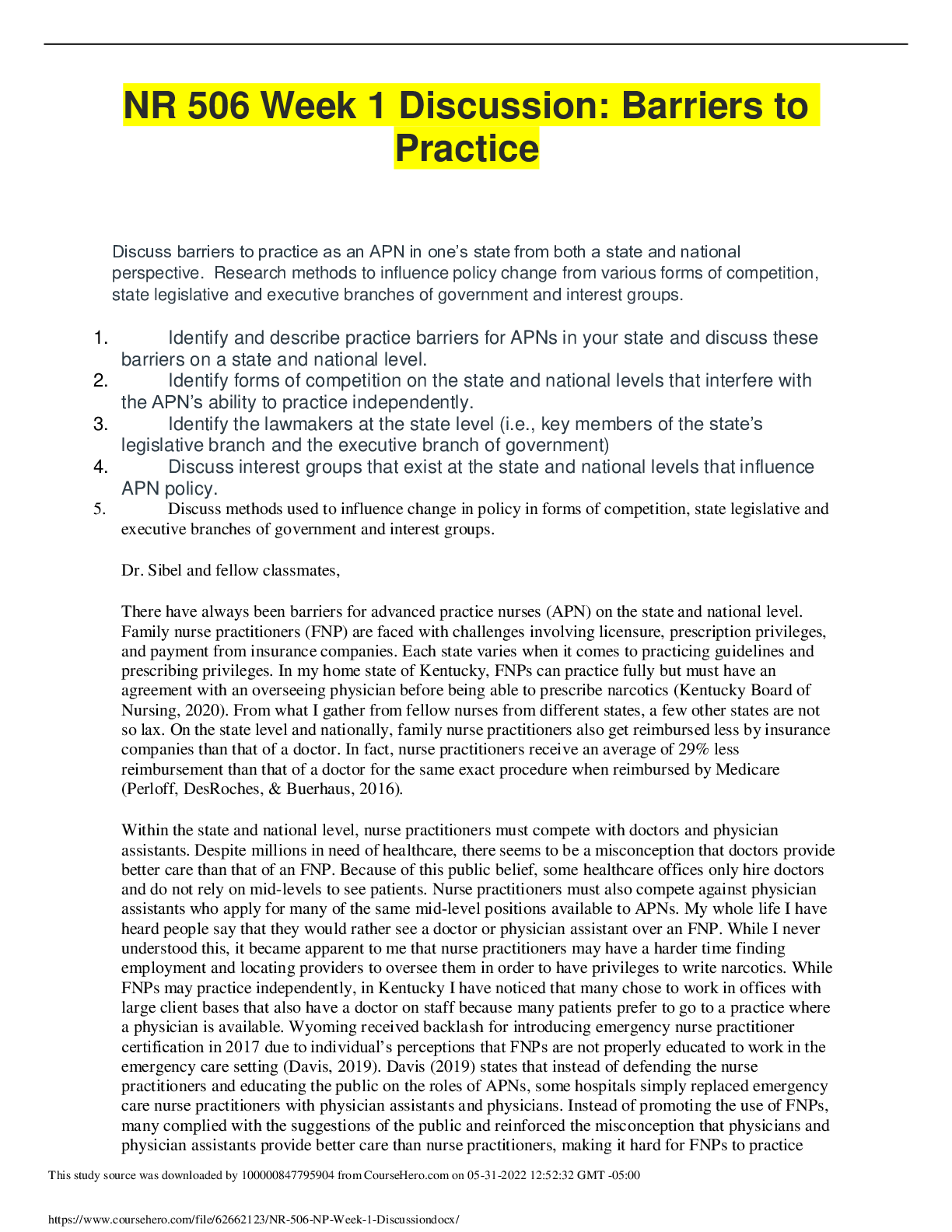
.png)
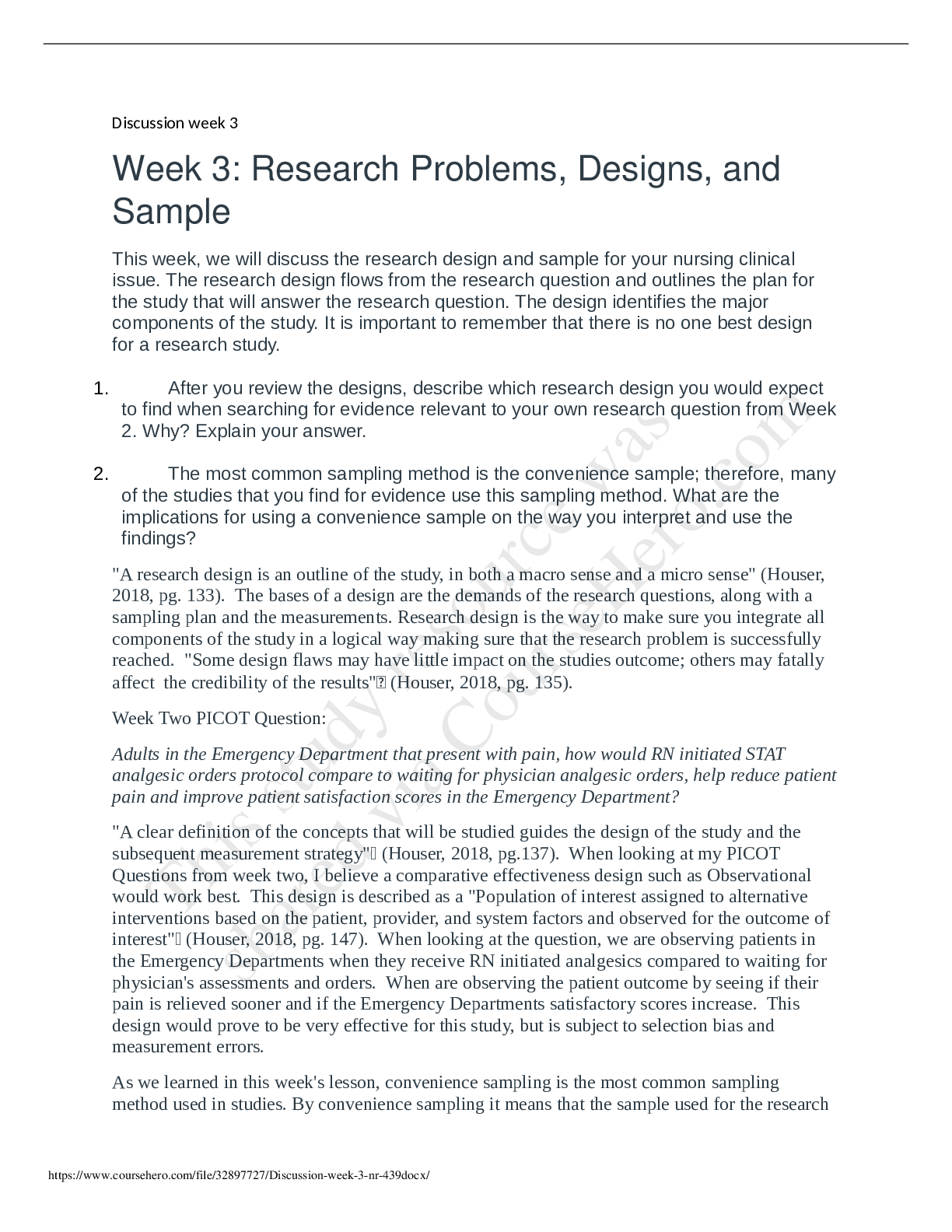
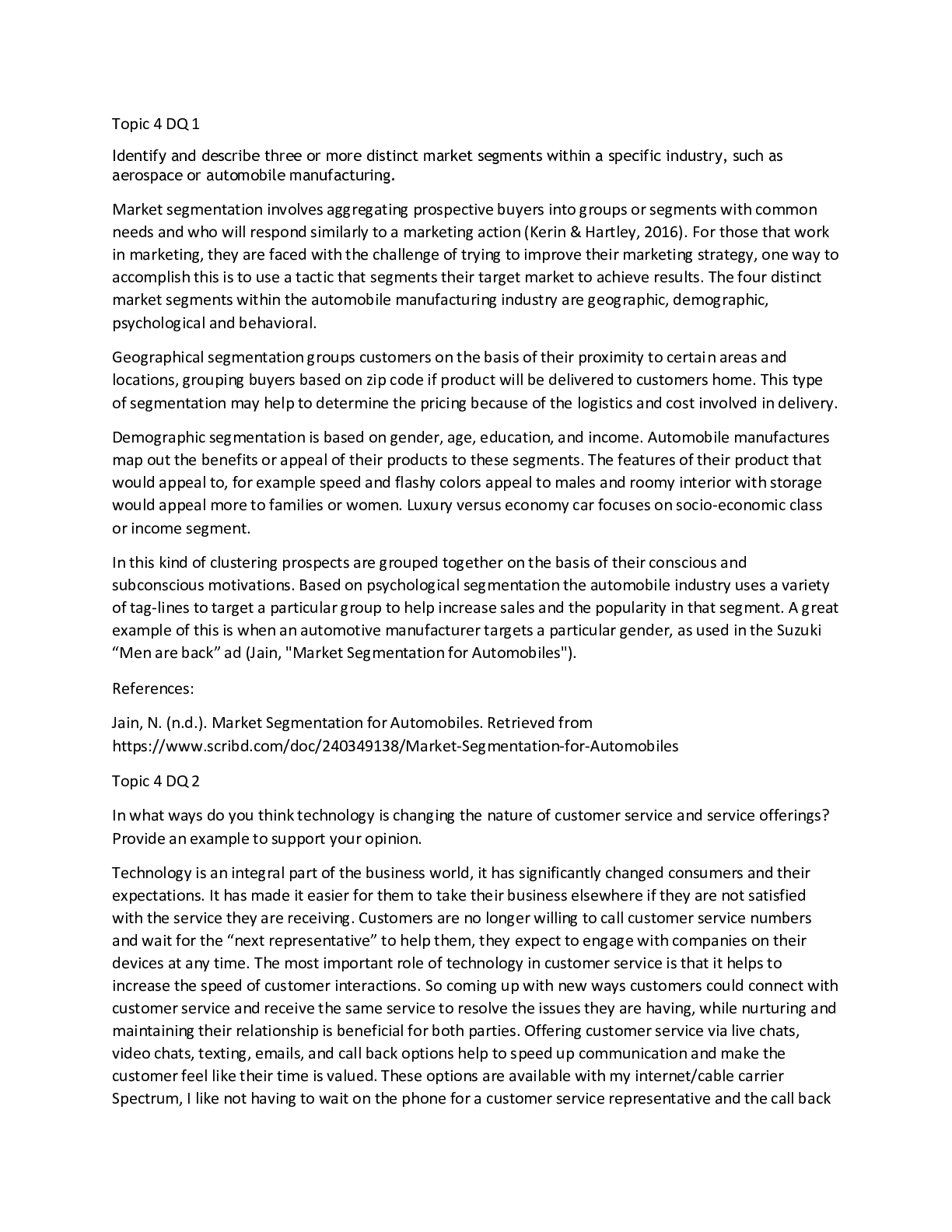
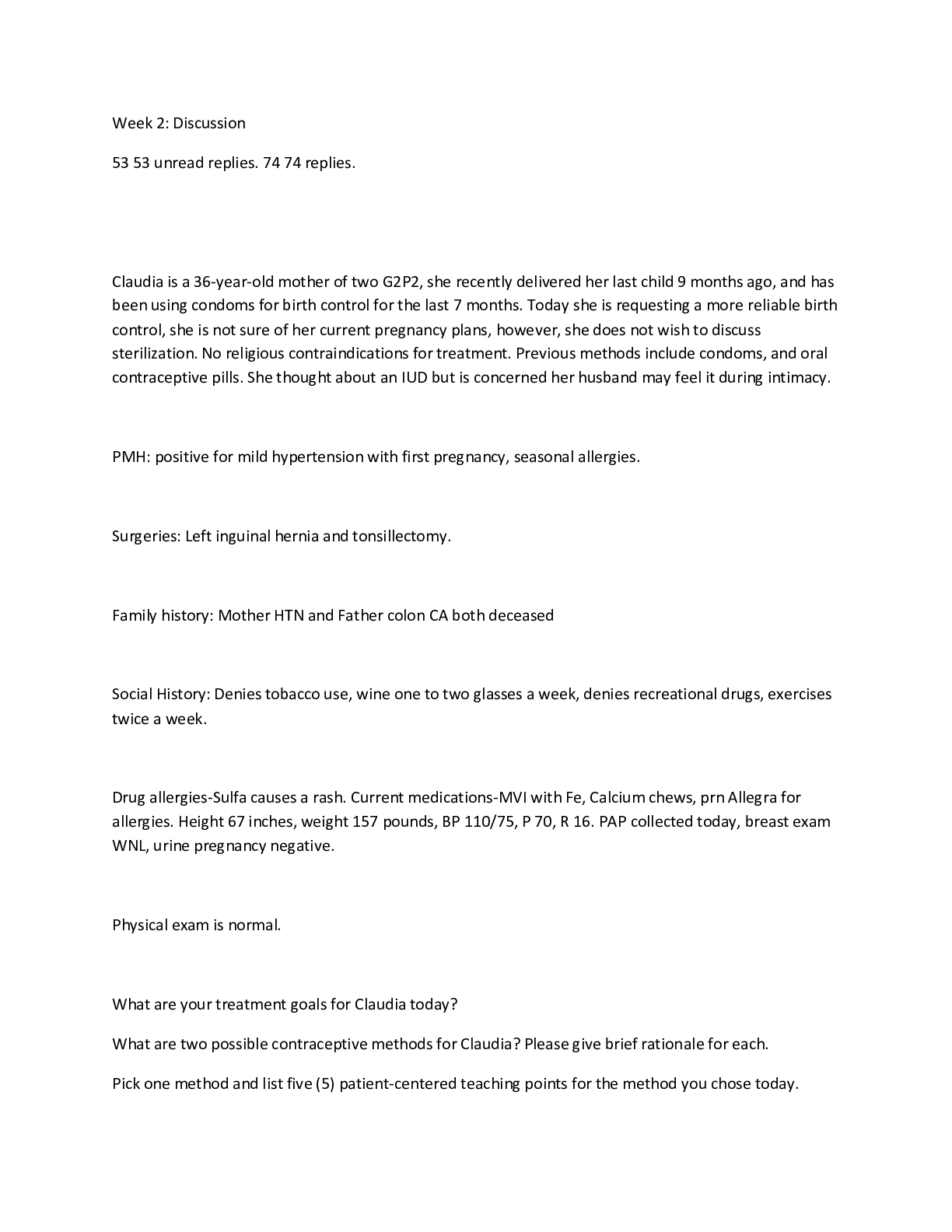
.png)
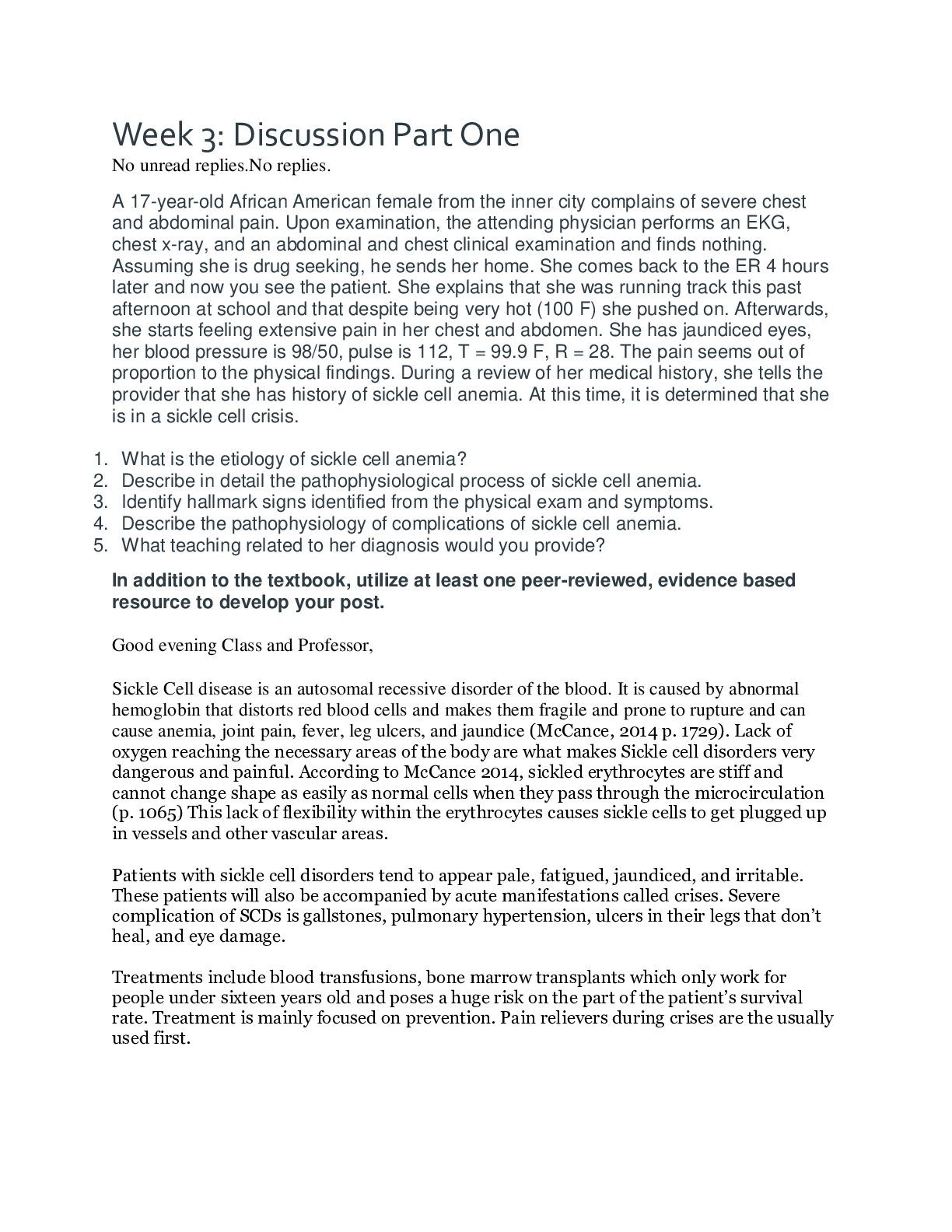
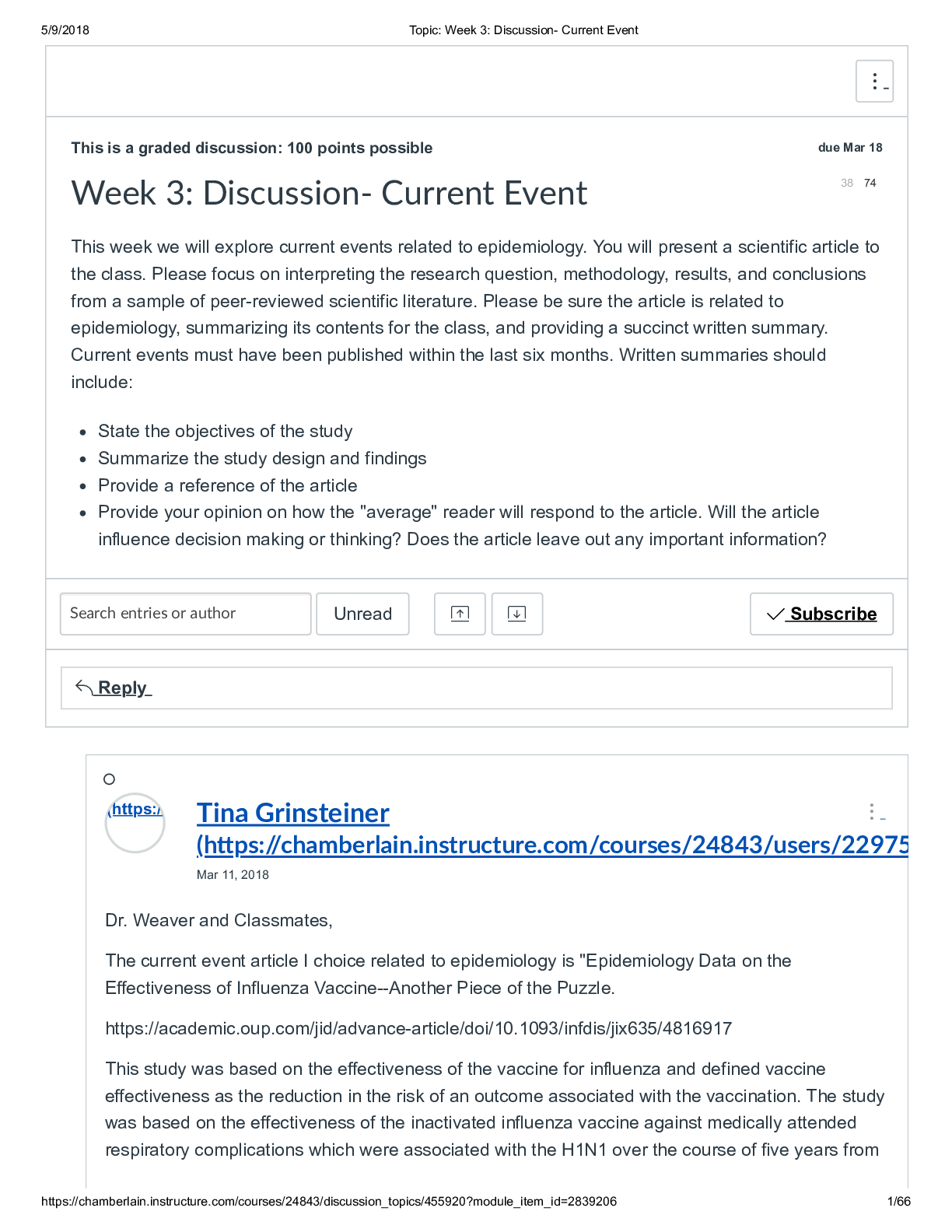
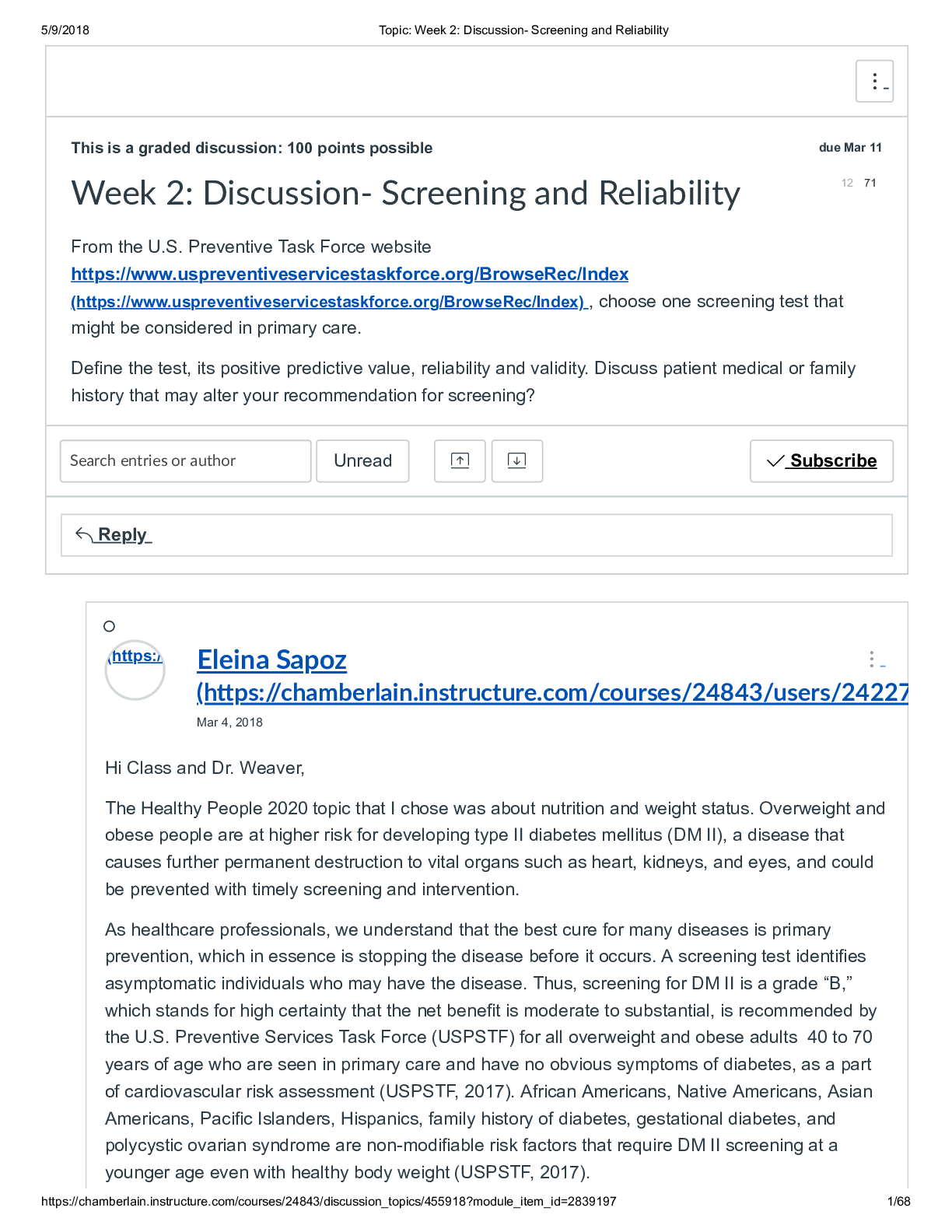
.png)
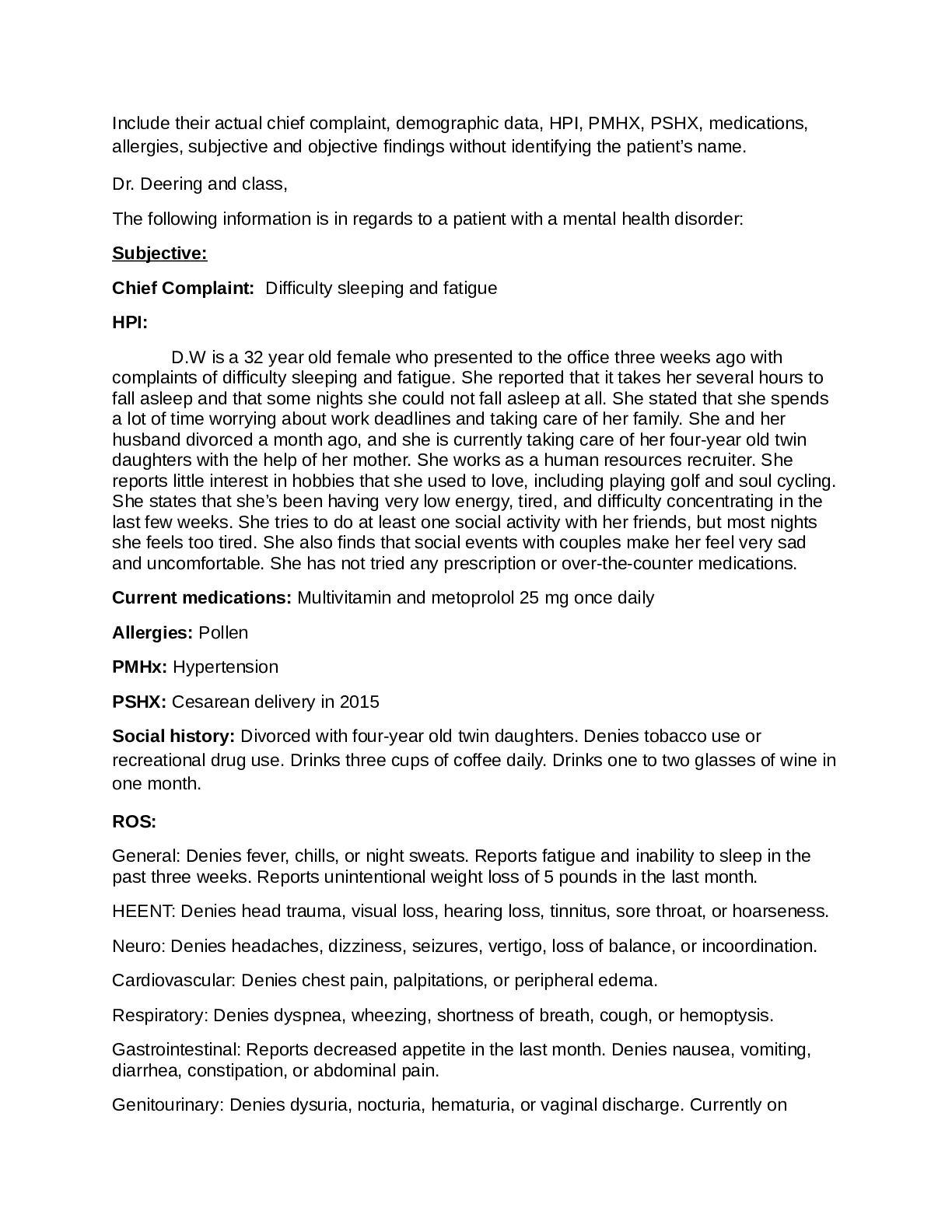



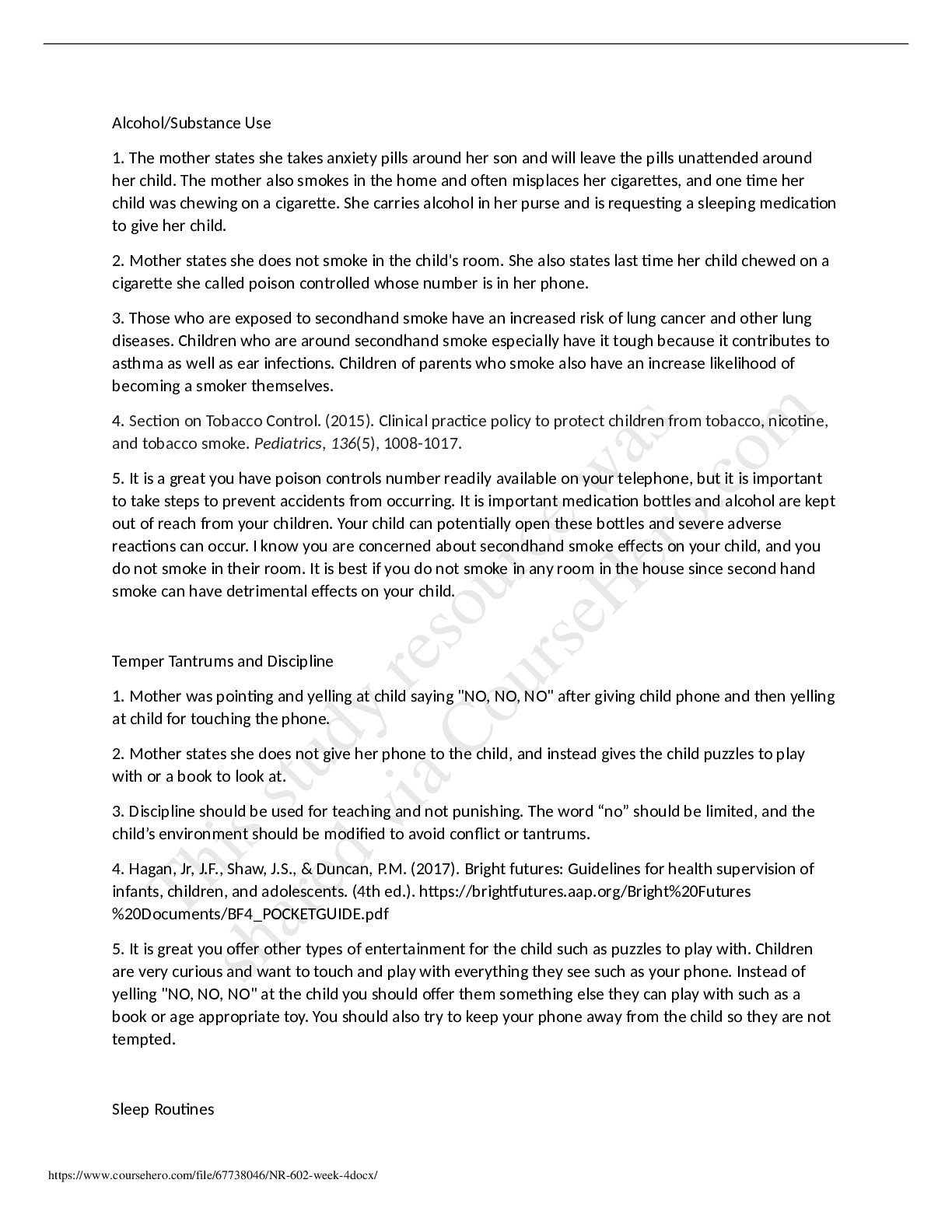

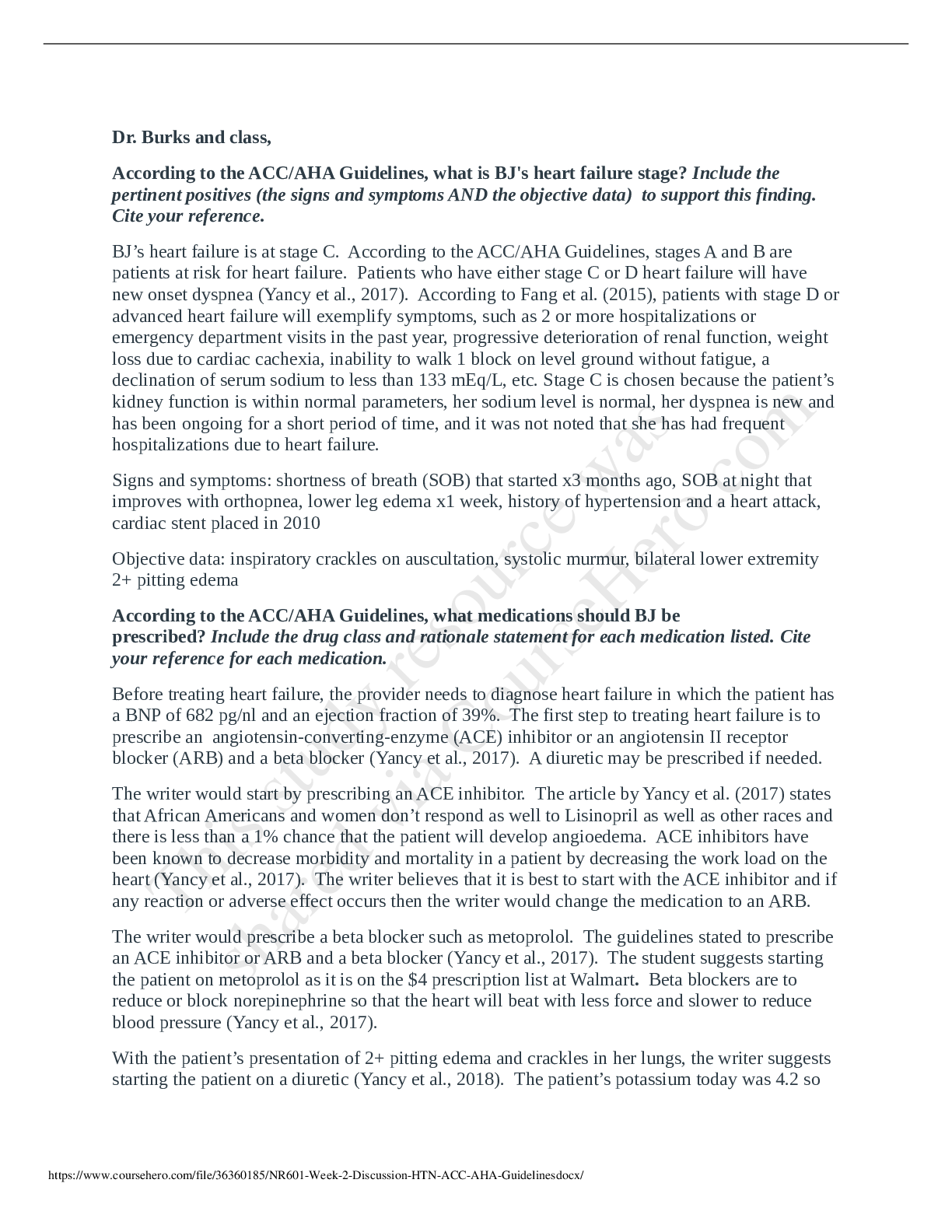
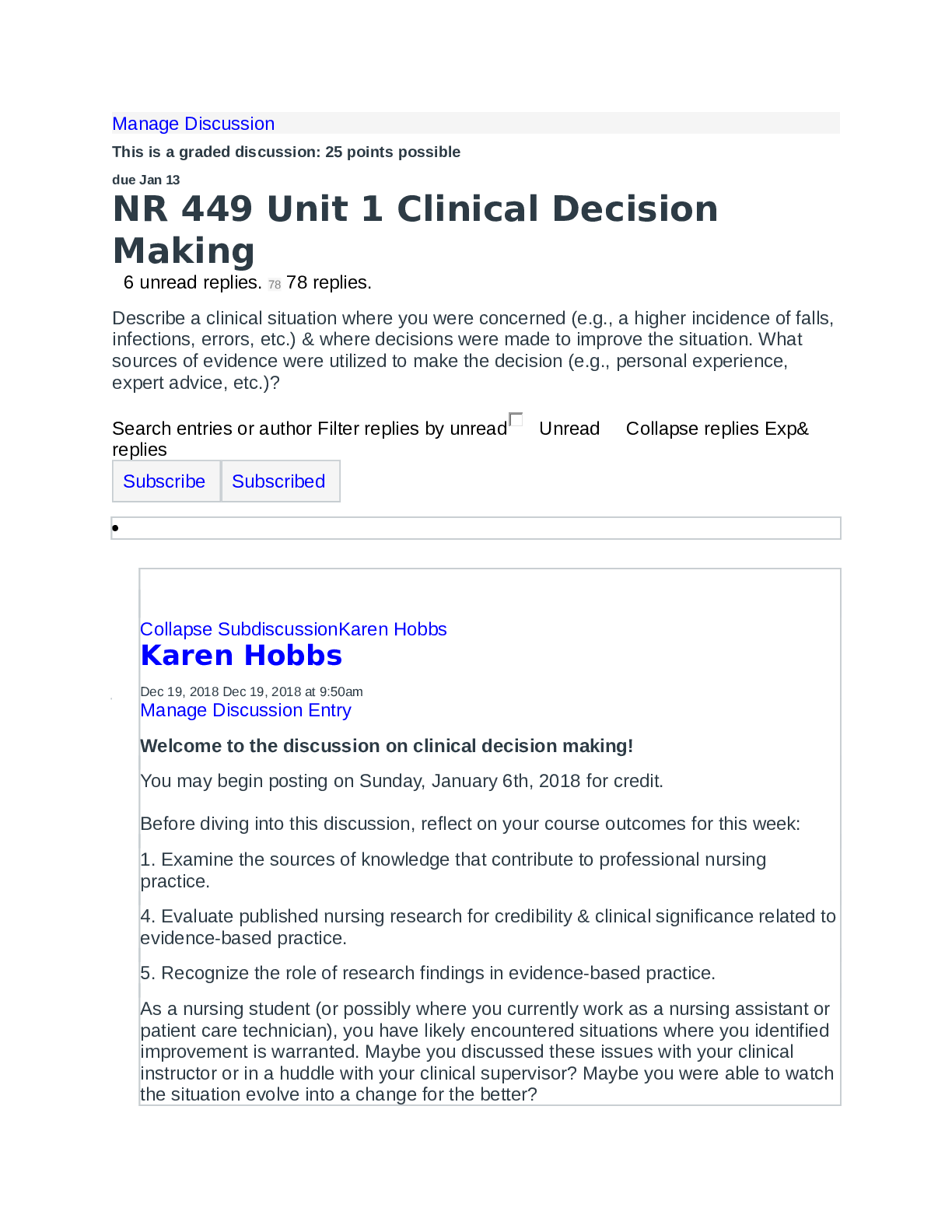
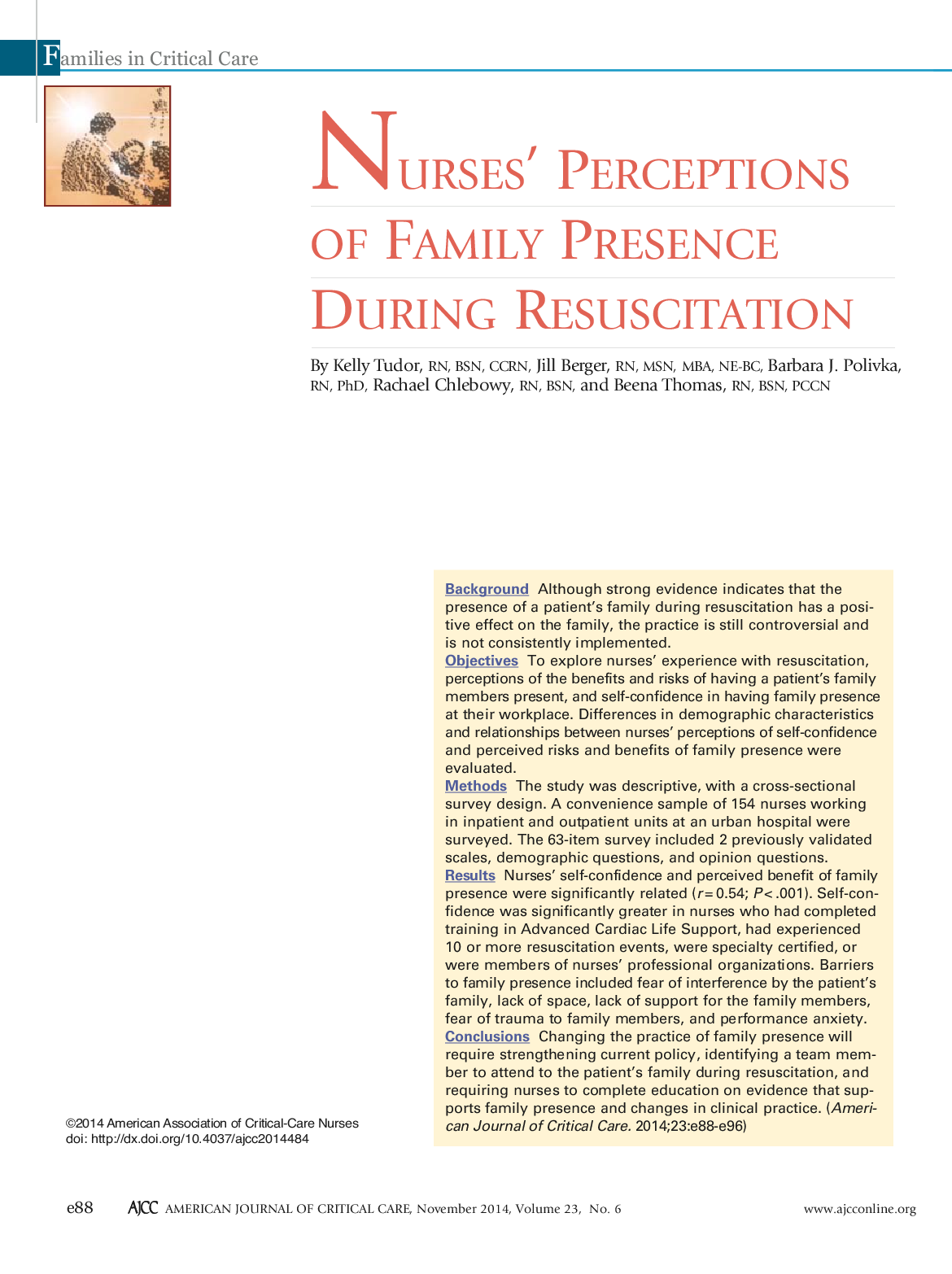
.png)
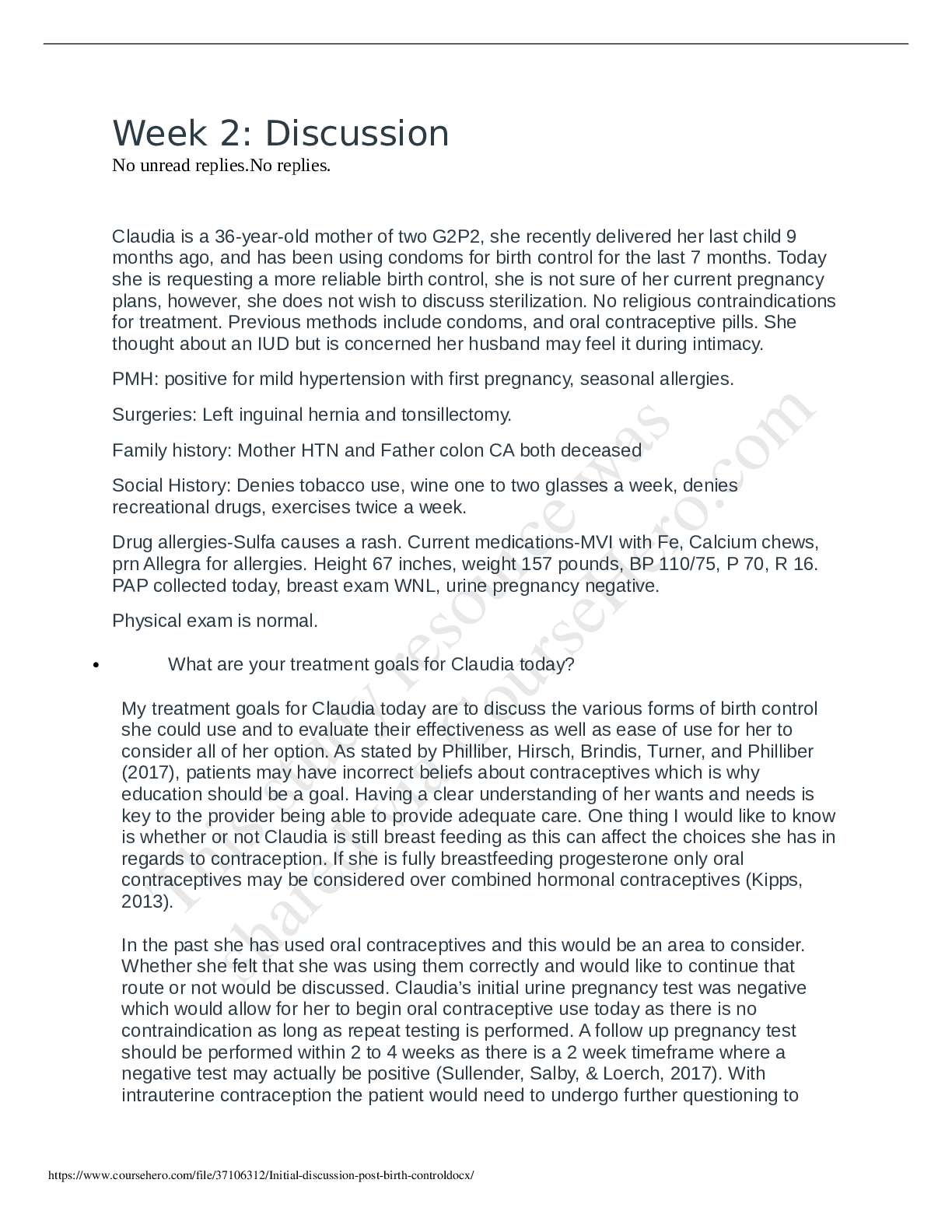

.png)



.png)
.png)
